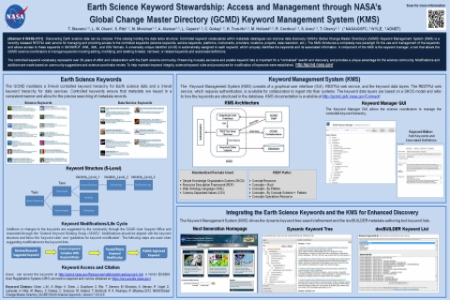
Discovering Earth science data can be complex if the catalog holding the data lacks structure. Controlled keyword vocabularies within metadata catalogues can improve data discovery. NASA’s Global Change Master Directory’s (GCMD) Keyword Management System (KMS) is a recently released a RESTful web service for managing and providing access to controlled keywords (science keywords, service keywords, platforms, instruments, providers, locations, projects, data resolution, etc.). The KMS introduces a completely new paradigm for the use and management of the keywords and allows access to these keywords as SKOS Concepts (RDF), OWL, standard XML, and CSV. A universally unique identifier (UUID) is automatically assigned to each keyword, which uniquely identifies each concept and its associated information. A component of the KMS is the keyword manager, an internal tool that allows GCMD science coordinators to manage concepts. This includes adding, modifying, and deleting broader, narrower, or related concepts and associated definitions.
The controlled keyword vocabulary represents over 20 years of effort and collaboration with the Earth science community. The maintenance, stability, and ongoing vigilance in maintaining mutually exclusive and parallel keyword lists is important for a “normalized” search and discovery, and provides a unique advantage for the science community. Modifications and additions are made based on community suggestions and internal review. To help maintain keyword integrity, science keyword rules and procedures for modification of keywords were developed.
This poster will highlight the use of the KMS as a beneficial service for the stewardship and access of the GCMD keywords. Users will learn how to access the KMS and utilize the keywords. Best practices for managing an extensive keyword hierarchy will also be discussed. Participants will learn the process for making keyword suggestions, which subsequently help in building a controlled keyword vocabulary to improve earth science data discovery and access.


